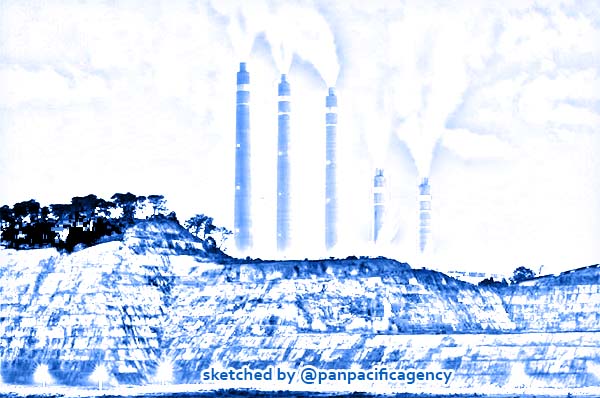Indonesian coal plant taints South Korea’s green pledge

Smoke and steam billows from the coal-fired power plant owned by Indonesia Power, next to an area for Java 9 and 10 Coal-Fired Steam Power Plant Project in Suralaya, Banten province, Indonesia, July 11, 2020. Picture taken July 11, 2020. REUTERS/Willy Kurniawan. Sketched by the Pan Pacific Agency.
SURALAYA, Lul 16, 2020, Reuters. Indonesian fisherman Ramidin says he used to catch stingray by paddling just off the shore of his village, but as a giant coal power complex nearby has expanded over the last three decades, he has had to venture further and further out to sea, Reuters reported.
Now, state-run Korea Electric Power Corporation (KEPCO) has confirmed it will partner Indonesia to add two more 1,000 megawatt units to the complex in Suralaya, which residents fear will further increase water and air pollution in the area.
KEPCO’s announcement late last month came despite South Korean President Moon Jae-in’s “Green New Deal” that was launched ahead of his party’s April parliamentary election victory and included loose pledges to end support for coal, at home and overseas.
The Java 9 and 10 units will be built and maintained by Doosan Heavy Industries & Construction Company, which received a nearly $3 billion bailout from South Korean state banks and institutions this year.
Greenpeace says the $3.5 billion expansion project could result in up to 1,500 premature deaths over the typical 30-year lifespan of a coal-fired power plant, as well as affect the air in the capital Jakarta, a city of 10 million people that lies 120 km (75 miles) to the east.
Many residents in Suralaya, on the western tip of Java, Indonesia’s most populous island, worry that the expanded coal complex will lock in decades of pollution that has plagued the once pristine village since the power complex began operating in 1984.
“It used to be able to catch fish closer to the shore but since those power plants were built, the waste may affect the fish, and they went away,” said Ramidin. “We didn’t use the motor (boat) back then. We only used the paddle to get fish.”
The Indonesian government and KEPCO say the new coal units will use the latest technology to minimise pollution. Local residents are sceptical.
“I’m also scared but what can I do?” said 51-year-old street vendor Sarwati, who sold her tofu salad and peanut sauce on a tourist beach before relocating to the centre of town after the most recent expansion of the Suralaya plant in 2011.
“I can only pray and believe in God to protect us.”
“EMPTY PROMISE”
Some analysts question the need for more coal power generation in Indonesia given the falling cost of renewable energy, a bleak economic outlook, environmental risks and over-capacity in some parts of the country.
Analysts have also questioned South Korea’s commitment to fighting climate change, given its lead role in the Suralaya plant expansion.
“It seems that the Korean government’s Green New Deal is just an empty promise,” said Julien Vincent, executive director of Market Forces, a climate lobby group.
“They have decided to continue supporting overseas coal finance without fully considering the implications on Korea’s reputation overseas and our shared climate.”
Globally, pressure has been mounting on governments and companies to end support for coal-fired power. KEPCO investors, including BlackRock, have raised concerns about the company backing new coal plants.
KEPCO said the company takes climate change seriously, and that the proposed Indonesian project meets the environmental standards set in South Korea.
Germany’s Siemens will also supply equipment to the project, despite making vague commitments to exit coal. A company spokesman said phasing out of coal investments did not include projects where it has existing contractual obligations.
Singapore bank DBS is among those providing financing to the project, two sources with direct knowledge said. DBS declined to comment.
Beyond environmental concerns, climate finance experts warn that if regulations are passed to cap CO2 emissions, plants like the one in Suralaya may have to close before debts have been repaid, leaving investors with costly stranded assets.
KEPCO said in a statement that the project passed a pre-feasibility study, deeming it to be profitable.
Reporting by Yuddy Cahya Budiman and Willy Kurniawan in Suralaya; Additional reporting by Jane Chung in Seoul, Anshuman Daga in Singapore and Alexander Hübner in Munich; Writing by Joe Brock; Editing by Raju Gopalakrishnan